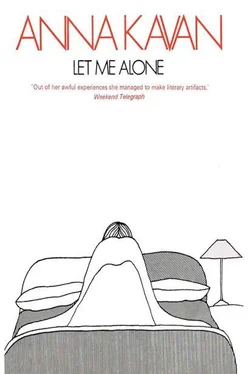There seemed to be an atmosphere of suspense in the room. As if they were deliberately waiting for some given signal before forming any opinion of Anna. Sure enough, someone said:
‘Mrs. Grove is very late to-night.’
And almost immediately there appeared a tallish, middle-aged, imposing-looking woman of the thin, black-haired, aquiline type, with an affected voice and a white, bony, tight-drawn death’s-head of a face which yet contrived to be fairly handsome. Mrs. Grove was the wife of the district commissioner, and the leading lady of Naunggyi.
‘How do you like the thought of living here?’ asked Mrs. Grove, with a cool, sardonic look, rather insolent.
‘I can’t believe yet that I am going to live here,’ said Anna.
Mrs. Grove smiled to herself, and twisted the end of her Batik scarf. She dressed very much better than the other women. And she continued to smile at Anna in her haughty de-haut-en-bas manner and to ask her questions, with the rest of the room as admiring and respectful audience. Anna got rather tired of it. But she answered as well as she could, and tried to look pleasant.
She felt hopelessly lost. What was she doing amongst these established, respectable British matrons? She couldn’t imagine what to say to them.
And presently a silence fell. The three women across the room-they were missionaries and formed a little clique of their own, quite apart from the others — stared, and whispered together. Mrs. Grove stared, twisting her scarf. Everyone stared. Anna felt as though she were some strange animal. And she knew that the weight of feminine opinion had swung over against her. She had made a bad impression in some way. She didn’t know how it had happened, what she had done wrong. She had started with the best intentions, she hadn’t wanted to antagonize them. It was simply that she didn’t know how to behave before them.
But she didn’t care. She was dazed with bewilderment and weariness. And she was hungry. It seemed an eternity since she had eaten anything. Would it never be time to go? She looked round, cold and despairing, at the whispering missionaries and the out-of-date copies of The Lady on the middle table, at the sinister, languid-voiced Mrs. Grove plucking at her scarf. She shuddered, and felt her heart coldly sinking. The petrol-lamp burned with a faint hissing noise. The room was dreary, dreary. The pale, staring, hostile faces of the women encircled her. She wondered vaguely what had become of all the men.
At last Matthew appeared — it was time to go away. They drove off again in the dark. And at last Anna could get something to eat.
Jonsen led the way to the dining-room — then came Matthew, still talking to him — then Anna. The men had not even washed their hands. Their heavy boots made a clatter in the silent house.
The dining-room was decidedly chilly. It had the peculiar stuffy chill of a room which has been kept shut up for a long time. And there was a pervasive, indescribable smell which seemed to emanate from the heavy furniture, a stale, sweetish and yet acrid smell, very indefinite, but marked, with a slight vinegarish flavour, something like the smell of the inside of an old wine barrel. The furniture was of dark wood, quite well-made, but heavy and clumsy-looking.
‘I hope you are fond of curry,’ Jonsen said. He twinkled at Anna across the table which was covered with a coarse cloth, clean, but with the look of having been rough-dried, without ironing. The plates and cutlery were old and of the cheapest description. Nothing matched.
The room was gloomy and close. Anna felt more and more depressed. But she took up her thick, yellowish fork, and ate the rice and the extraordinary brown mess of meat, burning hot and swimming in an oily sea of unknown ingredients, that was set before her. She was depressed: but the curry was good although it burned her mouth sharply. She got it down and began to feel better. Only there was the stale, unpleasant smell in the room, rather sickly. Matthew sat at the end of the table, and ate in quick, large mouthfuls.
The servant came in with an elaborate sweet-dish, a sort of shape, ornamented with pink and white sugar. This was for Anna. The cook had made it specially as a compliment to her, because women were supposed to like sweet things. Neither of the men would touch it. But Anna took some out of consideration for the cook’s feelings, and ate as much as she could.
The servants slithered in and out with plates. They brought fruit, short, stumpy, reddish bananas, little hard oranges, and nuts, and put them on the table.
So the meal came to an end. They went back to the drawing-room. Anna longed for a cup of coffee. But there wasn’t any. The men had another whisky and soda apiece. Anna drank a little out of Matthew’s glass, although she disliked whisky. She felt she needed the warmth. It was not that the night was really cold: but there was a damp, marsh chill which seemed to lower one’s vitality.
Jonsen got out his papers. He was determined to stick to business. He sat down with his notebooks and pencil — though Matthew was not very keen. He turned his back upon Anna. And then he began the dreary technical talk again.
‘Let’s leave it till to-morrow,’ said Matthew. But Jonsen talked on, keeping him occupied. He was determined that Anna should be left out.
There was a noise of frogs croaking in the marsh, a thin twanging of insects. This was the usual evening accompaniment. Jonsen monotonously reeled off figures and facts. There was something ogreish about him, simple, childlike as he was.
Anna went up to bed. No one seemed to take any interest in her, or to care whether she stayed or went away.
There was a lamp in her room. She turned it up and looked round. Nothing had been unpacked, nothing had been arranged. The room was just as she had left it, hours before. She went to the window. The stars flashed at her. There was a faint sheen of light, like a pale glaze, on the flat ground, ghostly and evanescent. She went out on to the veranda. The frogs made a great noise, an orchestration of hoarse, gruff sounds, almost like dogs barking. It was a marsh-kingdom: the spectral glimmer over the ground, the pallid mist in the distance; the watery smell, and all round the house, rough, raucous voices of frogs coughing and barking. Unearthly, it was — and dismal.
She got undressed. She was tired out, and stupified with astonishment and depression. She went to wash in the bathroom. The water which she poured out was still in the basin. She felt almost unconscious. Numbly she dragged down the mosquito-net and crawled into the hard, chilly bed. But there were no springs, it was rigid and unyielding as a plank-bed. And the sheets were coarse cotton. The touch of the cotton irritated her skin as though insects were creeping over her. She was restless, but half-stunned with weariness. The net was like a misty wall round her. She was in a trance of dejection and bewilderment. Through the doorless house she could hear vaguely the voices of the two men, talking, talking.
Presently they came upstairs. Anna started up from a half-sleep. Matthew was undressing in the room next to hers, the middle room. The light of his lamp came under and above the flaps of the doorway. She sat up and looked about her. She hardly knew if she were dead or alive. And she was terrified. And she was lonely. A nightmare terror took hold of her. Matthew put out his light. The ghastly, miasmal darkness covered everything. She felt she would die of the horror of the night, of the dark swamp all round the silent house. She was transfixed with horror. She felt utterly alone, helpless, lost in the horrific strangeness of the alien dark. The loneliness strangled her, she could not endure it.
Despair was like a dead hand on her heart. Where could she go, whom could she call? She was alone, alone, for ever. Then suddenly she felt her mind go blank, she was relaxed. She felt her exhaustion extinguishing fear, blotting out everything, extinguishing her. A sleep that was stronger than desperation drowned her completely, in a deadening flood.
Читать дальше












